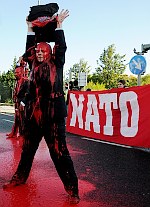In depth
Nonviolent action at the NATO summit

Carlos Pérez Barranco
A hundred activists from Portugal, Spain, Finland, Belgium, Canada, France, Germany, the Netherlands, Poland and Sweden blocked the entrance for delegates and officials participating in the NATO summit in Lisbon on Saturday 20 November. Using chains and padlocks connected to their bodies, they tried to delay the summit in order to denounce the policy of the Atlantic alliance. Activists also threw red paint on themselves to represent the victims caused by NATO actions. The activists blocked one of the main intersections in the security zone until the police moved in and arrested 42 people.
Activists participating in the anti-NATO camp organised by the Portuguese group CAGA, which hosted hundreds of European and international activists, were involved in these actions. According to CAGA's Jorge Paulo Antunes, "we use civil disobedience to highlight the violence committed by NATO in Afghanistan. They are meeting here today to perfect their arsenal of destruction. It is important to demonstrate, but we believe that it is not enough. With our action we use our bodies to obstruct the war machinery."
This type of action is new in Portugal, and they are taking place thanks to the increasing coordination between European pacifist and antimilitarist groups. This coordination and has already led to the organisation of large-scale disobedience actions, such as the invasion of the NATO headquarters in Brussels in the NATO Game Over action of 2008, and the blockades of the NATO summit in Strasbourg, in 2009. Likewise, groups such as Alternativa Antimilitarista-MOC in Spain, Vredesactie in Belgium, OFOG in Sweden, Non au missile M51 in France and Internacional de Resistents a la Guerra have long-standing contacts with CAGA for preparing civil disobedience actions in Portugal, and encouraging the growing interest from Portuguese activists in organising this type of initiative.
As well as the disobedience actions, in the afternoon, thousands of people (8,000 according to the Portuguese press) participated in the demonstration against the summit. The demonstration was organised by various Portuguese organisations and trade unions, which were mostly linked to the Portuguese Communist Party and the left wing Bloco de Esquerda, and it was not free of controversy due to the latter's refusal to allow organised activists from the anti-NATO camp convened by the anti-war and anti-NATO platform (PAGUEN, in its Portuguese abbreviation) to participate. Finally, the police allowed this group of activists to join the end of the demonstration, with a barrier of riot police between them and the demonstration itself. At the end of the demonstration, a group of around 400 people participated in a demonstration of solidarity with those arrested, which ended with a small march in the city, with samba groups and clowns. A few dozen people also gathered in front of the detention centre where those arrested had been sent before their release at midnight. They were finally charged with a minor offence of disobedience, and then lawyers added that the charge may not end up in court due to the irregularities committed during their arrest.
Despite the large number of Portuguese media that drew attention to the threat of disturbances taking place in the city, as had occurred at the previous NATO summit in Strasbourg, the protests were peaceful. During the weeks prior to the summit, the Portuguese media related the groups participating in the anti-NATO camp with the so-called Black Bloc. In response, the camp organised street actions throughout the week that highlighted the nonviolent nature of the protests, including a public training activity in the central square in Lisbon, focusing on the basic techniques for carrying out civil disobedience actions, a simulation of bombing in front of the central Rossio station, fields of crosses, adding red dye to a fountain and graffiti in businesses involved in the organisation of the Alliance's summit.